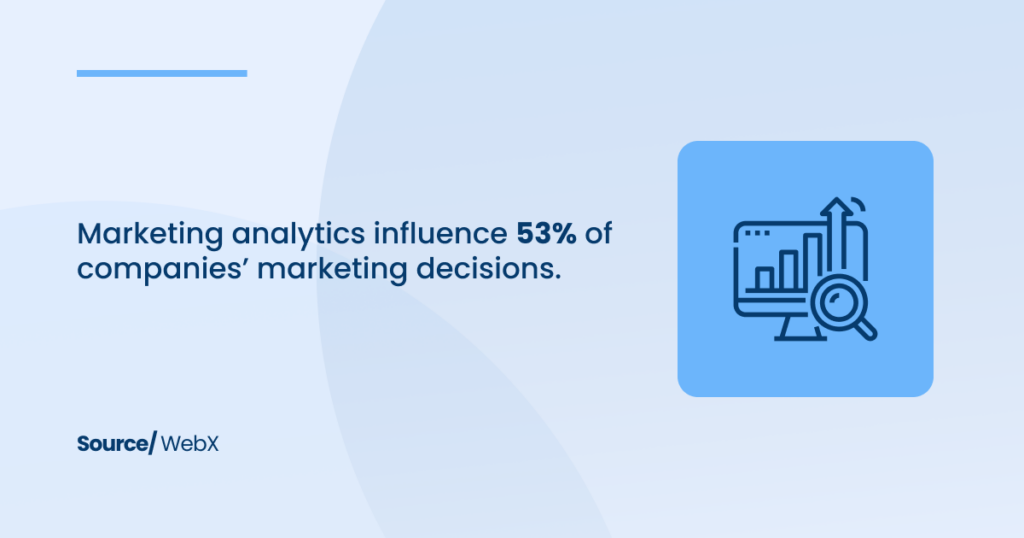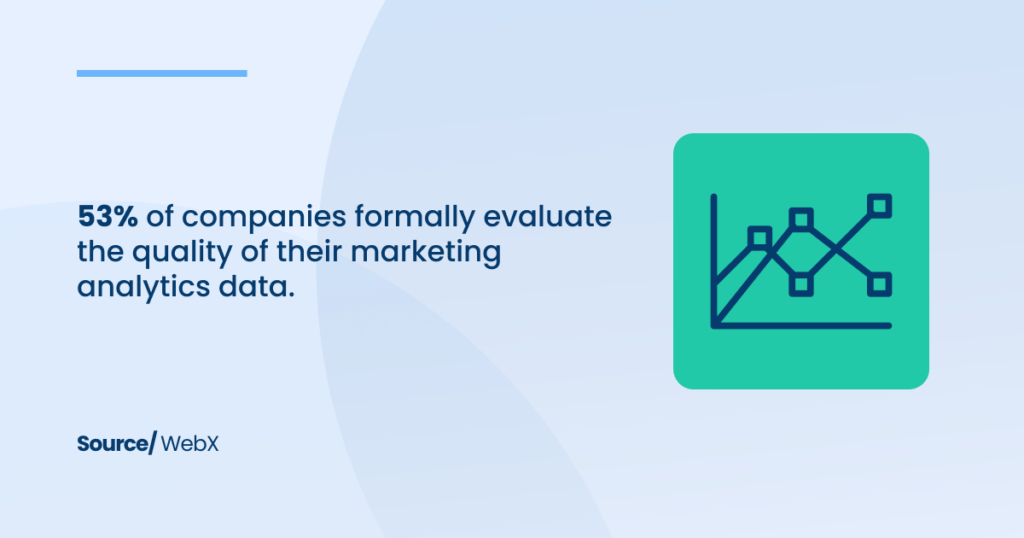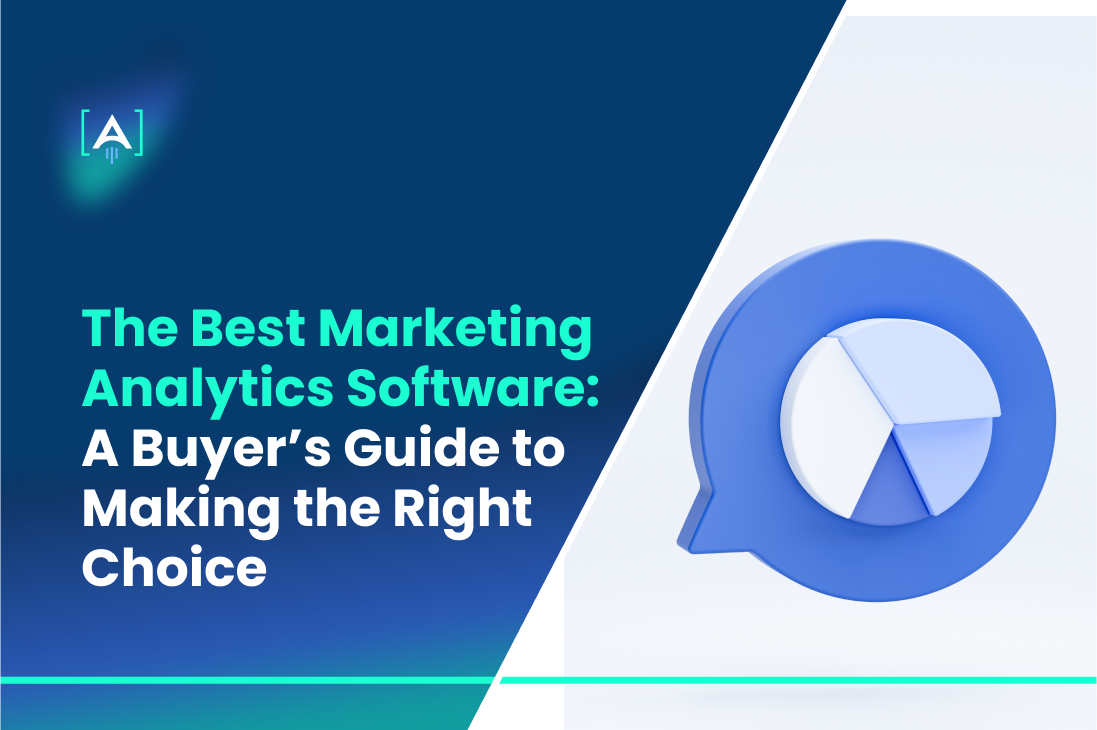In today’s competitive landscape, businesses need to make informed decisions based on reliable data.
Marketing analytics software provides the tools and insights necessary to track and measure marketing performance, identify trends, and optimize campaigns.
By leveraging the power of data, businesses can make more effective marketing decisions, improve ROI, and achieve their goals.
The global marketing analytics software market size was valued at USD 3.78 billion in 2022.
Source: Global View Research
The software is expected to grow at a compound annual growth rate (CAGR) of 16.7% from 2023 to 2030.
This growth reflects the rising importance of data-driven insights in optimizing marketing strategies and improving ROI.
Marketing Analytics & Reporting Agency will contribute to the proper optimization of the process.
The blog post will cover the key features and benefits of the best marketing analytics software, helping you select the right tool.
Marketing Analytics
Marketing analytics refers to the processes and technologies used to measure, analyze, and manage marketing performance.
By leveraging marketing analytics tools, businesses can gain valuable insights into their marketing strategies, consumer behavior, and overall business performance.
The rise of digital marketing has made it imperative for companies to utilize data analytics techniques to stay competitive.

In today’s data-driven world, marketers have access to more information than ever before, ranging from website performance to customer engagement across social media and email campaigns.
The ability to analyze this data effectively through marketing analytics software can be the key to making smarter marketing decisions and improving the overall ROI.
Importance of Using Marketing Analytics Software
In today’s competitive landscape, understanding how your marketing efforts are performing is crucial for success.
Data-Driven Decision Making
One of the most significant advantages of using marketing analytics tools is the ability to make data-driven decisions. Marketers can rely on accurate data to understand which campaigns are working and which need improvement.
These insights can also help businesses optimize their content strategy, budget allocation, and marketing channels.
Improved ROI
Marketing analytics software helps businesses identify which marketing campaigns generate the highest ROI.
Whether it’s a pay-per-click (PPC) ad, email marketing campaign, or social media outreach, analytics tools provide insights into how well each channel performs in driving conversions.
For example, with Google Analytics, a popular marketing analytics tool, businesses can track website traffic sources, user behavior, and conversion paths. It helps identify which marketing channels are yielding the best results, enabling businesses to allocate resources more efficiently.
Enhanced Customer Understanding
Understanding the customer journey is essential for any marketing campaign. Marketing analytics tools offer insights into customer behavior, preferences, and interactions with the brand.
By studying data gathered from multiple sources—such as social media, email campaigns, and website visits—companies can better understand their audience and cater to their specific needs.
Optimization of Marketing Strategies
With the help of marketing analytics tools, businesses can continuously optimize their marketing strategies.
By tracking key performance indicators (KPIs) like click-through rates, bounce rates, and conversion rates, marketers can identify areas that need improvement.
For example, Google Analytics allows businesses to measure and analyze website performance, making it easier to spot trends or issues.
If a landing page has a high bounce rate, marketers can investigate the reasons, such as slow loading times or irrelevant content, and make changes to improve the user experience.
Cross-Channel Performance Tracking
In today’s multi-channel marketing environment, businesses often use several platforms to reach their audience.
Marketing analytics solutions enable companies to track and analyze the performance of various channels, including social media, search engines, email, and more.
For example, Google Analytics integrates with other platforms like Google Ads and social media accounts to provide a comprehensive view of marketing performance. Marketers can see how well each channel contributes to overall goals and adjust strategies accordingly.
Key Features to Look for in Marketing Analytics Software
Selecting the right marketing analytics software is a critical step for businesses looking to optimize their marketing efforts and gain a competitive edge.
With various tools available, understanding the key features can help ensure you make an informed choice.
From data collection and integration capabilities to advanced AI and predictive analytics features, the right platform can transform raw data into actionable insights.
Data Collection and Integration Capabilities
At the core of any marketing analytics software is its ability to gather and integrate vast amounts of marketing data from multiple sources.
Businesses today use a variety of channels to reach customers, from social media platforms and email campaigns to search engines and websites. As such, the ability to consolidate data from these various sources is essential.

Data analytics tools should be able to integrate seamlessly with other systems like customer relationship management (CRM) platforms, ad networks, and content marketing analytics software.
The integration capabilities ensure that businesses have a complete view of their customers and their behavior.
This feature is particularly important for analyzing customer behavior, as it allows marketers to track the entire customer journey across multiple touchpoints.
Additionally, data collection should include both structured and unstructured data. Structured data includes numbers and metrics from campaign results, while unstructured data could be customer feedback, social media posts, or product reviews.
A robust marketing analytics platform can handle both, allowing businesses to conduct comprehensive data analysis and gain deeper insights into customer preferences and behavior.
Reporting and Visualization Tools
One of the primary purposes of using marketing analytics software is to interpret complex datasets into actionable insights.
Effective reporting and visualization tools allow marketers to make sense of vast amounts of data, transforming it into clear, understandable reports that highlight key metrics and trends.
Marketing analytics tools should offer customizable reports and visualizations. This enables teams to create reports that reflect the specific KPIs that matter most to their campaigns.
These could range from customer acquisition costs to engagement rates across channels. Moreover, interactive dashboards with graphs, charts, and tables help make it easier for teams to understand performance at a glance.
Data visualization is particularly crucial for decision-makers who may not have the time to sift through raw data.
These data analytics tools help break down the complexities of digital marketing analytics, allowing stakeholders to quickly see which strategies are performing and which need improvement.
Customization and Scalability
Every business has different needs, and as such, the best marketing analytics software should offer a high degree of customization and scalability.
Whether you’re a small business running a few campaigns or a large enterprise managing marketing efforts across multiple regions, your software should be able to grow with your needs.
Source: Customer Experience Customization and Optimization software
Scalability ensures that as your business expands and your data sets become larger, your marketing analytics platform can handle the increased workload. This feature is especially important for companies expecting rapid growth or an increase in customer touchpoints, ensuring that the platform continues to deliver valuable insights without performance issues.
Customization, on the other hand, allows businesses to tailor their marketing analytics tools to their specific workflows and goals.
Customizable dashboards, metrics, and reporting formats enable teams to focus on what’s important to them.
For instance, a B2B company may prioritize lead generation metrics utilizing b2b marketing analytics, while a B2C company may focus more on conversion rates and customer lifetime value.
Being able to customize the tool ensures that you are tracking the key metrics that are most relevant to your business.
Cross-Channel Tracking and Attribution
Today’s customers interact with businesses through multiple channels, from social media and email to search engines and websites.
Cross-channel tracking allows businesses to monitor customer interactions across all these platforms and channels in real-time.
A top-tier marketing analytics tool should be equipped with cross-channel tracking and attribution features. This capability enables businesses to understand how each channel contributes to their overall marketing goals.
Attribution models, such as first-click, last-click, or multi-touch attribution, help businesses allocate credit to different marketing touchpoints that lead to a conversion.
By analyzing the performance of each marketing channel, companies can make informed decisions about where to invest their marketing budget. This feature also allows for more accurate measurement of ROI across different channels.
For instance, if a user first interacts with a brand on social media but converts through a paid search ad, marketing analytics software can help marketers determine the relative value of each touchpoint.
Real-Time Analytics and Dashboards
In a fast-paced marketing environment, waiting days or weeks for performance reports can be detrimental to success.
That’s why real-time marketing analytics tools are essential. With real-time data analytics software, marketers can monitor campaign performance as it happens, allowing for immediate adjustments.
Real-time analytics and dashboards offer dynamic tracking of key performance indicators (KPIs), such as click-through rates, bounce rates, and conversion rates.
These features empower marketers to spot trends or issues in real-time and take action to improve performance.
For example, if an ad campaign is underperforming, real-time data allows marketers to adjust targeting, messaging, or budget allocations on the fly.
Additionally, real-time data ensures that businesses are always working with the most up-to-date information, allowing for more responsive and agile marketing strategies.
Dashboards in marketing analytics software should be highly customizable and interactive, allowing users to view the metrics that matter most to their specific objectives.
This functionality is particularly beneficial for time-sensitive campaigns, such as product launches, sales promotions, or limited-time offers.
By utilizing real-time data, businesses can maximize the impact of these campaigns by making instant optimizations.
AI and Predictive Analytics Features
One of the most exciting developments in marketing analytics is the integration of AI and predictive analytics features.
As businesses collect more data than ever, AI-powered tools are essential for conducting advanced data processing tasks beyond human capability. These tools use machine learning algorithms to uncover patterns in data and provide predictive analytics that forecast future outcomes.
Source: A breakdown of global AI growth statistics between 2022 and 2032, AIPRM
With predictive analytics marketing, businesses can predict customer behavior, forecast sales trends, and optimize marketing strategies based on historical data. This allows companies to anticipate customer needs and proactively tailor their marketing efforts for better results.
For example, predictive analytics can help identify which customers are most likely to churn and which products are most likely to succeed in a given market.
AI-powered marketing analytics tools can also automate repetitive tasks such as data sorting, analysis, and reporting. This not only saves time but also ensures greater accuracy in the insights provided.
AI in marketing analytics enables businesses to stay ahead of trends, personalize marketing campaigns, and make more informed decisions.
Moreover, predictive analytics can improve customer segmentation, allowing businesses to deliver more personalized experiences based on predicted behaviors.
For example, AI can analyze past purchase history and browsing behavior to recommend products or services that a customer is likely to be interested in.
Types of Marketing Analytics Software
Marketing analytics software comes in various forms, each designed to meet the specific needs of different marketing channels.
By understanding the types of marketing analytics tools available, businesses can select the right software for their campaigns, helping them optimize performance and gain deeper insights into their target audiences.
Whether it’s web analytics, social media analytics, SEO analytics, or email marketing analytics, each tool offers unique benefits to marketers looking to improve their strategies.
Web Analytics Tools
Web analytics tools are designed to track website performance and user behavior.
These tools help businesses understand how visitors interact with their websites, what pages they spend time on, and how they navigate through different sections of the site.
Web analytics tools are essential for measuring the effectiveness of digital marketing campaigns and making data-driven decisions to improve the user experience.
Google Analytics
When it comes to web analytics tools, Google Analytics is the most widely used and powerful option available.
This marketing analytics software provides a comprehensive overview of website performance, offering insights into key metrics such as traffic sources, bounce rates, and conversion rates.
Source: Google Analytics
Google Analytics automates data collection and tracks user interactions across multiple channels, providing a holistic view of a website’s performance. Businesses can use this data analytics tool to segment their audience, understand user behavior, and optimize marketing strategies for higher conversions.
Social Media Analytics Tools
Social media platforms are key channels for many businesses, offering unique opportunities to engage with audiences and promote content. However, managing social media performance across multiple platforms can be challenging without the right tools, such as content marketing analytics software.
Social media analytics tools provide insights into engagement metrics, follower growth, and the overall effectiveness of social media campaigns.
Sprout Social
Sprout Social is a leading social media analytics tool that helps businesses manage and analyze their social media performance.
It integrates with platforms like Facebook, Instagram, Twitter, and LinkedIn, allowing marketers to track engagement metrics such as likes, shares, comments, and clicks.
Source: Sprout Social
This marketing analytics software provides businesses with a centralized dashboard to monitor their social media accounts and identify which content resonates most with their audience.
By using data analytics techniques, Sprout Social enables businesses to understand their audience’s preferences and behavior, helping them create more targeted and effective social media strategies.
SEO and Search Analytics Tools
SEO (Search Engine Optimization) is crucial for driving organic traffic to a website, but optimizing for search engines can be complex. SEO and search analytics tools help businesses monitor their search engine rankings, keyword performance, and backlink profiles.
These tools are essential for developing an effective SEO strategy and staying ahead of competitors.
SEMrush
SEMrush is a leading SEO and search analytics tool that offers a wide range of features for keyword research, competitor analysis, backlink tracking, and on-page SEO audits.
This marketing analytics software is widely used by businesses and marketing agencies alike to enhance their SEO efforts.
With SEMrush, marketers can analyze their website’s performance and compare it to competitors, helping them identify opportunities to improve rankings and attract more organic traffic.
The platform provides detailed insights into keyword performance, allowing users to optimize their content marketing analytics software for relevant search terms.
SEMrush also offers tools for tracking PPC (Pay-Per-Click) campaigns, making it an all-in-one solution for digital marketing analytics.
Its comprehensive data analysis capabilities provide actionable insights, helping businesses refine their strategies and achieve better search engine visibility.
Email Marketing Analytics Tools
Email remains one of the most effective marketing channels, especially for nurturing leads and driving conversions.
Email marketing analytics tools provide businesses with detailed insights into how their email campaigns perform, offering metrics such as open rates, click-through rates, and conversion rates.
Mailchimp
Mailchimp is one of the most popular email marketing analytics tools available today. It offers businesses the ability to create, manage, and analyze email campaigns from a single platform. Mailchimp helps businesses analyze data from their email campaigns, offering insights into subscriber engagement, such as open rates and click-through rates.
Source: Mailchimp
This marketing analytics software also provides segmentation tools that allow businesses to send targeted emails based on subscriber behavior or demographics.
By utilizing data analytics and reporting, Mailchimp helps marketers refine their email strategies for better engagement and higher conversions.
E-commerce Analytics Tools
For e-commerce businesses, tracking customer behavior, sales performance, and inventory levels is critical for success.
E-commerce analytics tools provide insights into every aspect of an online store’s performance, from traffic and conversions to product performance and customer lifetime value.
Shopify Analytics
Shopify Analytics is an essential tool for e-commerce businesses using the Shopify platform. It provides a comprehensive overview of sales performance, customer behavior, and website traffic, making it easier for businesses to optimize their online stores.
Source: Shopify
Shopify Analytics tracks key metrics such as total sales, average order value, and customer acquisition costs, helping businesses understand their overall performance.
The platform also provides insights into product performance, allowing businesses to identify their best-selling products and optimize their inventory accordingly.
This marketing analytics software also integrates with other data analytics tools, such as Google Analytics and Facebook Ads, providing a holistic view of marketing performance.
By combining data from multiple sources, Shopify Analytics allows businesses to make informed decisions about their marketing strategies and improve their ROI.
Partner with [A] Growth Agency for Your Marketing Analytics and Reporting Strategies
As technology advances, marketing analytics software’s capabilities will only continue to expand.
By staying informed about the latest trends and best practices, businesses can ensure they are equipped to leverage their full potential.
[A] Growth Agency will turn your entrepreneurial dreams into reality with effective, tailored growth strategies.
Our experienced team believes in the power of data to inform and drive every strategy, ensuring our actions are as effective as they are innovative.
With years of experience in digital marketing, we have a proven track record of helping businesses achieve their growth objectives.
If you want to achieve even better results, go ahead.

